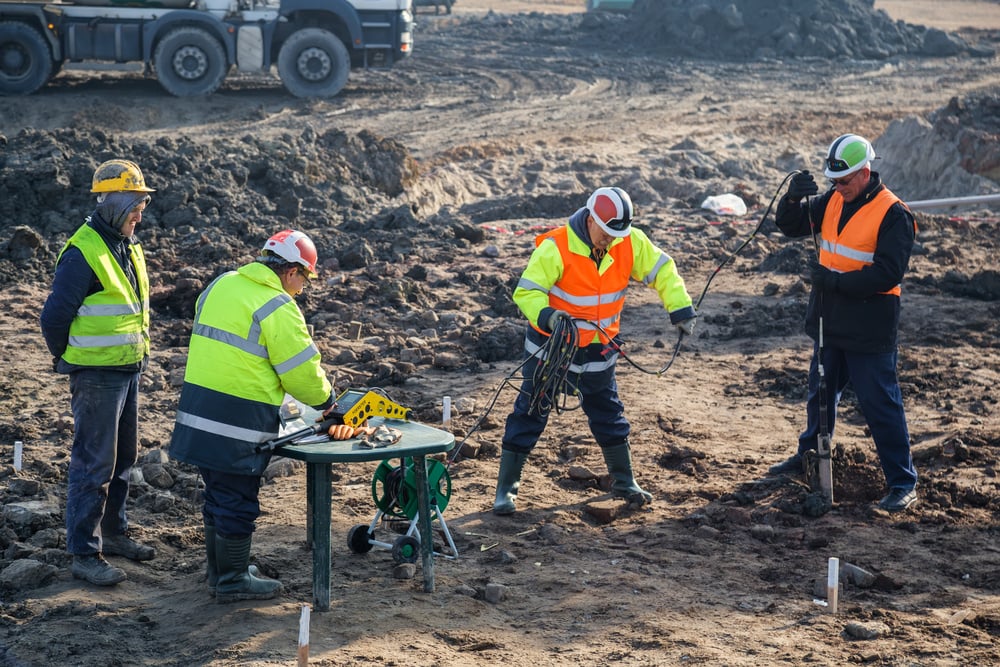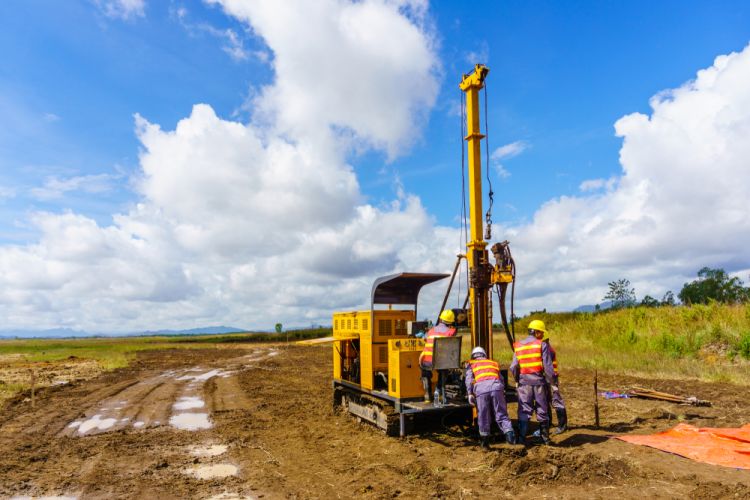The Of Geotechnical Engineering For Construction Projects
The Of Geotechnical Engineering For Construction Projects
Blog Article
The 2-Minute Rule for Geotechnical Engineering For Construction Projects
Table of ContentsNot known Incorrect Statements About Geotechnical Engineering For Construction Projects The Single Strategy To Use For Geotechnical Engineering For Construction ProjectsSome Known Facts About Geotechnical Engineering For Construction Projects.Rumored Buzz on Geotechnical Engineering For Construction ProjectsThe Basic Principles Of Geotechnical Engineering For Construction Projects
Consequently, throughout the investigation, it is essential to drill at the called for deepness and the called for number of openings based on the suggestion of the Canadian Structure Design criterion. Often, the proprietor might save some Geotechnical Investigation expense yet wind up spending more than the expected during the building and construction expense.The duties of the geotechnical expert include supplying product screening for construction support. Geotechnical Engineering for Construction Projects. Geotechnical designers analyse all the area test reports to guarantee that building and construction is going on based on the project requirements. During building, a confirmatory test for soil compaction is done on-site to make certain that no future settlement takes place
After the concrete is poured -7 days and 28 days- tests are performed on concrete examples accumulated from the website to ensure that the concrete put fulfills the style standard. Asphalt core is taken after the Asphalt is laid and compressed to validate that it meets the layout requirement. All research laboratory test reports are evaluated by the Geotechnical Engineer to guarantee that it meets the task requirements.
Some Known Incorrect Statements About Geotechnical Engineering For Construction Projects

Geotechnical design plays an important function in making sure the security of construction tasks. Discover exactly how it impacts layout and total task success. Geotechnical engineering is a vital branch of civil engineering that focuses on recognizing the practices of planet products, such as dirt and rock. It involves evaluating subsurface conditions to guarantee that a building's structure or facilities is stable and safe and secure.

For a reputable structure and a smooth building process, depend on to offer the proficiency you need. Call to obtain professional advice and geotechnical services customized to your next job.
The Definitive Guide for Geotechnical Engineering For Construction Projects
When starting a land advancement job, understanding the ground beneath your feet is as crucial as the frameworks you intend to develop above it. Our Geotechnical Engineering team analyse the ground, ensuring it is ideal for the proposed advancement while offering you with the info needed to satisfy your task objectives.
Geotechnical Design looks at the development of the ground, as it is the structure blocks for all tasks. Where frameworks require to be developed with respect to the ground conditions; ground problems (e.g., soft ground) may need enhancing depending on the size of the desired framework. Before building, you require to understand about the groundwater, soil structure, and liquefaction chance of your land.
For websites that are not attached on the regional authority infrastructure added site examinations would be called for to give technical inputs for on-site stormwater and wastewater. We have actually experienced Geotechnical Engineers based in each office, sustaining your geotechnical needs nationwide. Connect to us to discuss exactly how we can support your following project.
These records are customized to satisfy the particular needs of a task and include style specifications and suggestions for the building of a variety of synthetic frameworks. As giving consultancy solutions covering areas such as slope stability and load-bearing abilities for different materials, these designers take on research and advancement activities to enhance methodologies, devices, products knowledge and analysis covering entire lifecycles.
Geotechnical Engineering For Construction Projects Can Be Fun For Everyone

Nonetheless, prices of pay usually raise as your expertise and abilities expand, with standards indicating a graduate starting income of between 18,000 and 28,000 per year in the UK. This rises to 26,000 to 36,000 with a couple of years of experience and after that reaching 40,000 to 60,000+ see for senior, legal or master engineers.
With the right application it is feasible to master the profession and gain access to a difficult yet fulfilling and vital occupation. A geologist would need to re-train to become a geotechnical designer, although there is lots of cross-over between the two professions, which can make this much easier - Geotechnical Engineering for Construction Projects. Rock hounds need to have an understanding of dirts, rocks and other products from a scientific viewpoint, while geotechnical designers tale their expertise of matters such as dirt and rock technician, geophysics and hydrology and apply them to design and environmental tasks
When starting out, these designers will certainly often tend to service home much less intricate projects, developing understanding and experience ready for even more tough work later on. Geotechnical engineers have a tendency to specialise in specific locations as they expand in experience, focusing on specific frameworks such as railways, roads or water. These engineers likewise collaborate with eco-friendly energy, offshore and onshore oil and gas, nuclear power, and extra.
Examine This Report on Geotechnical Engineering For Construction Projects
The time taken to come to be a geotechnical designer depends on where you are based, where you research study and what level of education you desire to obtain before entering the office. Generally-speaking it takes 3-4 years to reach the standard demands to start a career as a geotechnical designer.
These procedures make it possible for experts to analyze a host of dirt mechanics consisting of weight, porosity, void-to-solid fragment proportion, leaks in the structure, compressibility, maximum shear stamina, bearing capacity and contortions. If the structure requires a deep structure, engineers will use a cone infiltration test to approximate the quantity of skin and end bearing resistance in the subsurface.
When evaluating a slope's balance of shear tension and shear strength, or its ability to endure and undergo activity, rotational slides and translational slides are typically thought about. Rotational slides fall short along a curved surface area, with translational slides occurring on a planar surface area. A specialist's goal is to figure out the conditions at which an incline failing might take place.
Often, searchings for recommend that a website's soil must be go right here dealt with to enhance its shear strength, tightness and leaks in the structure prior to layout and building. When it comes time to outline structure plans, experts are significantly concentrated on sustainability, more particularly how to decrease a structure's carbon footprint. One method has actually been to replace 20 percent of a structure's cement with fly ash, a waste item from coal fire nuclear power plant.
Report this page